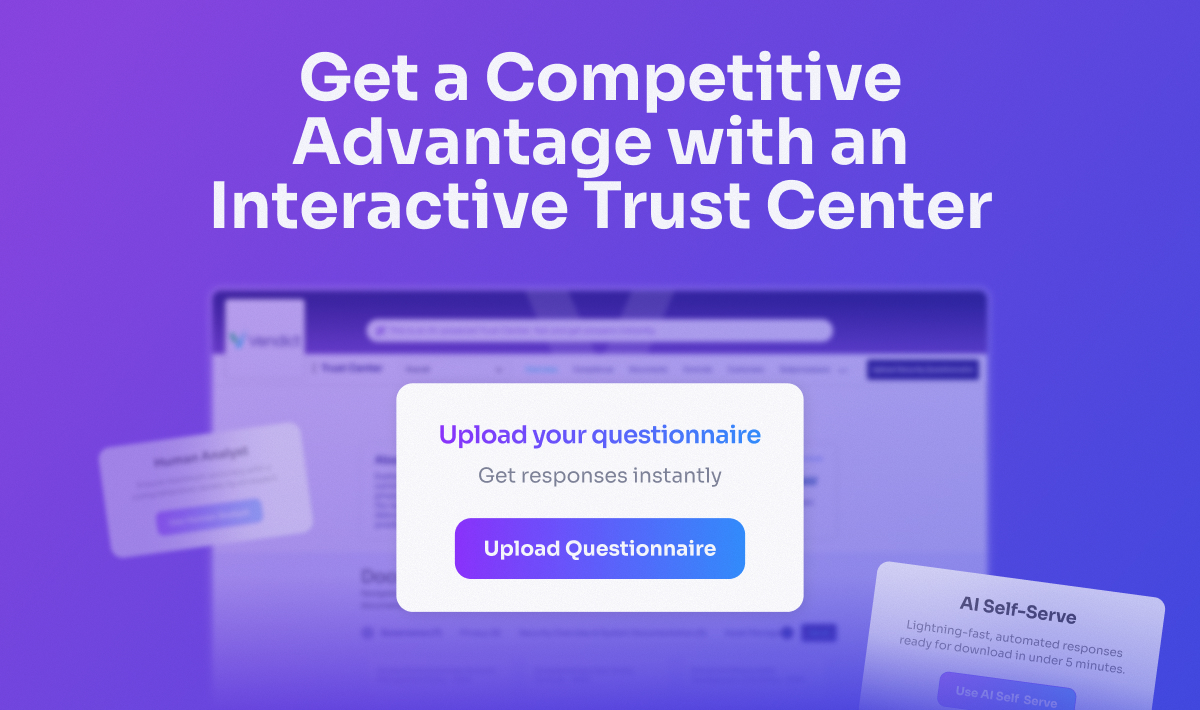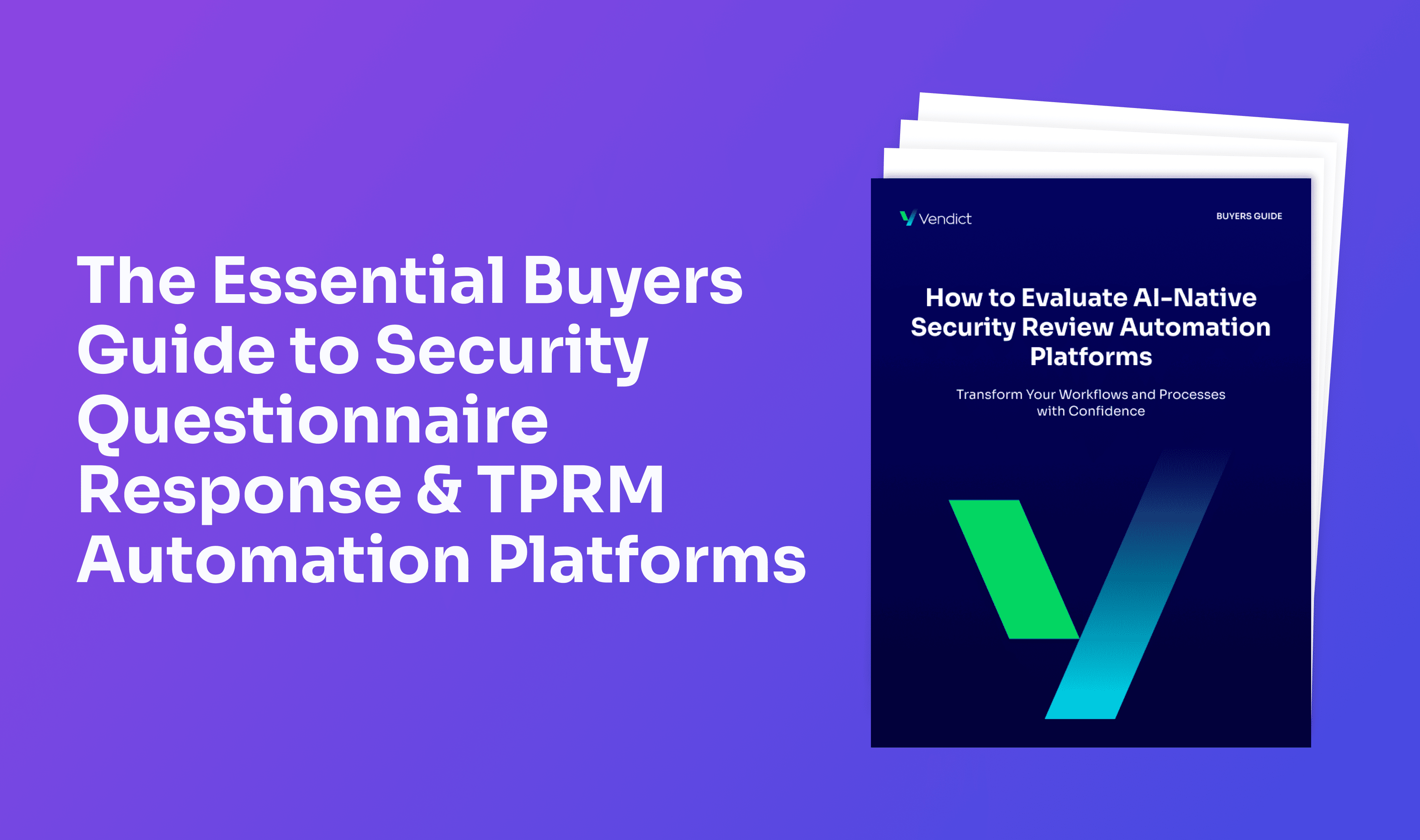Vendor Security Questionnaire: Top Questions To Ask

In the age of interconnected digital ecosystems, vendor security assessments have become paramount in mitigating the risks posed by the rapidly evolving cyber threat landscape. These questionnaires are crucial in identifying and addressing vulnerabilities that third-party vendors might bring into an organization, which is pivotal in preventing potential data breaches and cyber attacks. With cyber threats becoming more sophisticated, organizations must stay informed about the latest security concerns.
Updating and refining vendor security questionnaires to reflect new and emerging threats is not just advisable; it's necessary for maintaining robust cybersecurity defenses.
The Significance of Vendor Security Questionnaires
Vendor security questionnaires are more than just a formality; they are a critical component of an organization's proactive security posture. Their significance lies in the ability to preemptively identify and address security vulnerabilities and gaps in a vendor's practices before malicious actors can exploit them. This proactive approach is essential in a landscape where cyber threats constantly evolve, becoming more sophisticated and challenging to detect.
The depth and breadth of these questionnaires offer a comprehensive view of a vendor's security stance, encompassing their policies, procedures, security infrastructure, and employee training programs. This thorough examination is crucial for understanding not just the technical aspects of a vendor's security setup but also the procedural context in which these technologies are implemented.
Furthermore, vendor security questionnaires are instrumental in establishing and building trust between organizations and their third-party vendors. By conducting these assessments, organizations demonstrate their seriousness about security, encouraging vendors to meet or exceed these standards. In the dynamic world of cyber threats, these questionnaires must be constantly updated and refined to reflect new challenges and threats, making them a living document and a reflection of an organization's commitment to cybersecurity.
Key Benefits of Vendor Risk Assessment Questionnaires
Vendor risk assessment questionnaires offer a range of significant benefits that extend beyond the surface level of cybersecurity:
- Enhanced Risk Management: These questionnaires help organizations identify and understand the risks posed by vendors, leading to more effective risk management strategies. They allow for a deeper analysis of potential vulnerabilities that third-party relationships might introduce into the system.
- Compliance Assurance: With various regulations like GDPR, HIPAA, and SOC 2 in place, these questionnaires ensure that vendors comply with relevant legal, regulatory, and security standards. This helps in avoiding costly penalties and legal complications associated with non-compliance.
- Informed Decision Making: The insights gained from these assessments enable organizations to make more informed decisions about which vendors to engage with. They can avoid or mitigate risks by selecting vendors with robust security postures.
- Reputation Protection: By ensuring that vendors adhere to high security standards, organizations can protect their own reputations. In the event of a data breach, having a diligent vendor assessment process can demonstrate to stakeholders that all reasonable measures were taken to prevent such incidents.
- Strategic Security Alignment: These questionnaires help align the security practices and standards of vendors with those of the organization, creating a more secure and cohesive operational environment.
A List of Vendor Security Questions You Should Consider
In shaping a robust vendor security questionnaire, it's essential to focus on questions tailored to the current cybersecurity landscape, addressing specific organizational and industry standards. Here's a more detailed look at the types of questions to consider:
- Essential Security Questions: Begin with comprehensive security questions that cover general cybersecurity practices, frameworks followed, and certifications obtained. These initial questions set the tone for understanding the vendor's overall commitment to security.
- Organizational Security Policies and Procedures: Delve into the vendor's internal security policies. How do they manage data privacy? What are their incident response strategies? Understanding their policies will give insight into their security ethos and operational maturity.
- Data Protection Measures: Data is often a company’s most valuable asset. Questions should explore the mechanisms in place for data encryption, both at rest and in transit, and how data integrity is maintained. It’s crucial to understand their data handling practices, including data retention, deletion policies, and compliance with data protection regulations.
- Security Assessments and Audits: Inquire about the frequency, scope, and outcomes of internal and external security audits. Questions should probe into how often these audits are conducted, who performs them, and how findings and recommendations are implemented.
- Vulnerability Management: Evaluate their process for vulnerability management. How frequently do they scan for vulnerabilities? What’s their process for patch management and addressing identified vulnerabilities? Understanding their vigilance in this area is crucial in assessing their capability to respond to new threats.
- Employee Training and Awareness: Assess the vendor's approach to ongoing cybersecurity training and how they foster a culture of security awareness among their staff. This can include inquiries into the frequency of training and the methods used to keep employees informed about the latest security threats and best practices.
- Disaster Recovery and Business Continuity: Questions should delve into the specifics of their disaster recovery (DR) and business continuity planning (BCP). How comprehensive are these plans, and how frequently are they tested? Understanding their preparedness for unforeseen events is crucial.
- Third-Party Relationships: Since vendors can have their own supply chain of third parties, it's essential to understand how they assess and manage the security of their subcontractors or partners.
- Real-time Threat Monitoring: Explore their capabilities in monitoring threats in real time. Do they have a dedicated security operations center (SOC)? What tools and technologies are they using for continuous monitoring and responding to incidents?
These questions form a comprehensive framework, helping organizations gauge the security maturity of their vendors and make informed decisions about their collaborations. Properly assessing these areas is critical in today’s interconnected and increasingly risky digital landscape.
Vendor Security Questionnaires Best Practices
Effective vendor security questionnaires blend thoroughness, relevance, and adaptability. The effectiveness of these questionnaires is not just in the questions asked but also in how they are used to assess and improve the security postures of both the organizations and their vendors. Customization is key; questionnaires should be tailored to address the specific risks and security requirements relevant to the industry and the particular vendor relationship. This customization ensures that the assessments are appropriate and effective, avoiding the pitfalls of generic, checkbox-style audits that may overlook critical risks.
Clear and transparent communication is another cornerstone of effective vendor questionnaires. This communication is not just about asking the right questions but also about explaining the importance of these questions to vendors, ensuring that they understand the context and the necessity behind each query. This approach leads to more accurate and honest responses, providing a clearer picture of the vendor's true security posture.
Regular questionnaire updates are necessary to keep pace with the evolving cyber threat landscape. These updates, informed by the latest cybersecurity trends and incident reports, ensure that the questionnaires remain relevant and effective in identifying new and emerging threats. Moreover, a comprehensive evaluation process that goes beyond simple yes-or-no answers to include follow-up questions, discussions, and even on-site assessments, can provide a more in-depth understanding of a vendor's security practices.
Collaborative approaches, where vendors are seen as partners in the quest for better security, can also enhance the effectiveness of these questionnaires. Such a partnership encourages vendors to be more open and proactive in addressing security concerns, fostering a relationship built on mutual trust and shared goals of maintaining robust cybersecurity defenses.
In essence, vendor security questionnaires, when executed with a focus on customization, communication, regular updates, and collaboration, can significantly strengthen an organization's overall cybersecurity strategy. They are not just tools for assessment but are also instruments for continuous improvement and engagement in the ever-evolving domain of cyber risk management.
Bottom Line
Vendor security questionnaires are fundamental to modern cybersecurity practices, acting as a proactive defense mechanism against potential risks and facilitating compliance and trust in vendor relationships. By adopting best practices and maintaining open communication, organizations can fortify their cybersecurity posture and effectively mitigate vulnerabilities. Far from being a mere formality, these questionnaires are a strategic tool for protecting data, reputation, and business continuity.
.png)









.png)